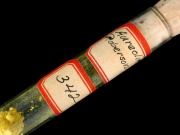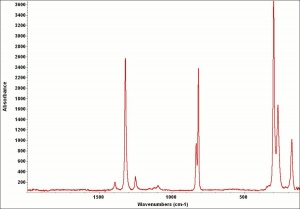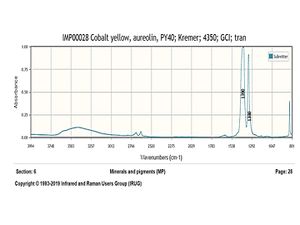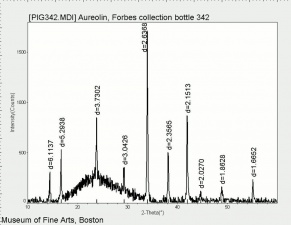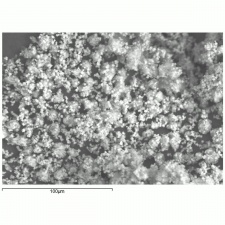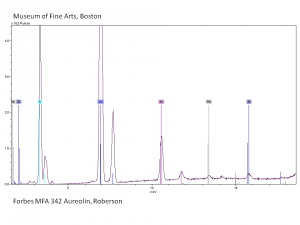Difference between revisions of "Aureolin"
| Line 8: | Line 8: | ||
cobalt yellow; potassium cobaltinitrite; Pigment Yellow 40; CI 77357; Kobaltgelb (Deut.); aureolina (Esp.); jaune de cobalt (Fr.); giallo di cobalto (It.); aureolina (It.); amarillo de cobalto (Esp.) | cobalt yellow; potassium cobaltinitrite; Pigment Yellow 40; CI 77357; Kobaltgelb (Deut.); aureolina (Esp.); jaune de cobalt (Fr.); giallo di cobalto (It.); aureolina (It.); amarillo de cobalto (Esp.) | ||
| − | [[[SliderGallery rightalign|CobaltylUCL.jpg~Raman|AureolinIRUG.JPG|PIG342.jpg~XRD|f342sem.jpg~SEM|f342edsbw.jpg~EDS|Slide9 FC342.PNG~XRF]]] | + | [[[SliderGallery rightalign|CobaltylUCL.jpg~Raman|AureolinIRUG.JPG~FTIR|PIG342.jpg~XRD|f342sem.jpg~SEM|f342edsbw.jpg~EDS|Slide9 FC342.PNG~XRF]]] |
== Other Properties == | == Other Properties == | ||
Revision as of 14:33, 3 June 2019
Description
A brilliant, transparent yellow pigment also known by the name cobalt yellow. Cobalt yellow is composed of potassium cobaltinitrite. It was discovered by N.W. Fischer in Germany in 1848. Cobalt yellow was introduced as an artists' pigment in 1852 (Saint-Evre) and began selling commercially in the U.S. in 1861. Aureolin is a permanent pigment, but may discolor to brown when mixed with indigo in the presence of hydrogen sulfide. Because of its poor hiding power, cobalt yellow is most often used in watercolor and tempera paints, for oil-based glazes and as a colorant in glass.
Synonyms and Related Terms
cobalt yellow; potassium cobaltinitrite; Pigment Yellow 40; CI 77357; Kobaltgelb (Deut.); aureolina (Esp.); jaune de cobalt (Fr.); giallo di cobalto (It.); aureolina (It.); amarillo de cobalto (Esp.)
Other Properties
Slightly soluble in water, ethanol, ether and carbon disulfide. Soluble in acids producing a pink solution. Decomposes in alkalis evolving nitrogen oxide fumes.
| Composition | K3[Co(NO2)6].3H2O |
|---|---|
| CAS | 13782-01-9 |
| Density | 1.8 |
| Refractive Index | 1.72 - 1.76 |
Hazards and Safety
Ingestion may cause poisoning with decreased blood pressure, headaches, nausea, vomiting and cyanosis.
Additional Information
° M.Cornman, "Cobalt Yellow", Artists Pigments, Volume 1, R. Feller (ed.), Cambridge University Press; Cambridge, 1986.
° Pigments Through the Ages: Cobalt yellow
Additional Images
Sources Checked for Data in Record
- The Dictionary of Art, Grove's Dictionaries Inc., New York, 1996 Comment: Artists Pigments
- R. J. Gettens, G.L. Stout, Painting Materials, A Short Encyclopaedia, Dover Publications, New York, 1966
- Ralph Mayer, A Dictionary of Art Terms and Techniques, Harper and Row Publishers, New York, 1969 (also 1945 printing)
- Reed Kay, The Painter's Guide To Studio Methods and Materials, Prentice-Hall, Inc., Englewood Cliffs, NJ, 1983
- Michael McCann, Artist Beware, Watson-Guptill Publications, New York City, 1979
- Susan E. Schur, Conservation Terminology: A review of Past & Current Nomenclature of Materials, Technology and Conservation, Spring (p.34-39); Summer (p.35-38); Fall (p.25-36), 1985
- Book and Paper Group, Paper Conservation Catalog, AIC, 1984, 1989
